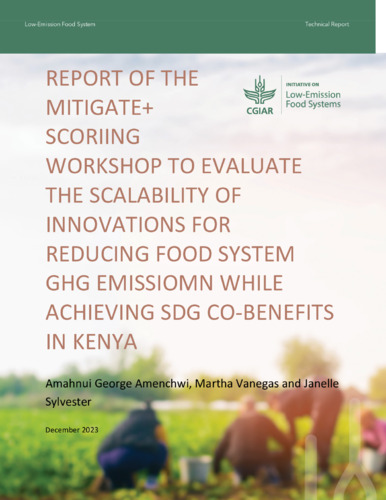Report of the Mitigate+ Scoring Workshop to evaluate the scalability of innovations for reducing food system GHG emission while achieving SDG co-benefits in Kenya
The food systems are not only central to our daily lives but also act as a major driver of greenhouse gas (GHG) emissions; it generates more than a third of global anthropogenic greenhouse gas emissions. As the world aims to achieve the goal of holding the increase in the global average temperature to well below 2 °C above pre-industrial levels, there is a need to identify, prioritize and scale innovations that can contribute to food systems transformation and generate SDG co-benefits. Acknowledging this need, the scoring meeting that took place in Nairobi on December 8, 2022, and February 20, 2023, was aimed at assessing the potential of some selected technologies/innovations to scale in Nandi, Kenya. The technologies/innovations evaluated during the workshops were Improved Livestock Breeds and Feeds (ILBF), Integrated Aquaculture Practices (IAP), Biogas Technology (BT) and Alternative Wetting and Drying for rice (AWD). These technologies were selected for scoring based on their alignment with Kenya’s national and local development plans and priorities, their GHG mitigation opportunity in the context and their potential to deliver SDG co-benefits. A framework was developed with multicriteria for
evaluating the scalability of the technologies/innovations. Thereafter, a scoring system was developed to evaluate the extent to which the criteria in the framework were fulfilled for scaling. Two workshops were organized with representatives of member organizations of the multi-stakeholder platform of climate smart agriculture in Kenya. During the workshops, group discussions were organized to obtain the score for each criterion as well as provide reasons for their scores. Our findings showed ILPF obtained a total score of 24.83 (75.35%) out of 33 points meanwhile IAP obtained 27 points out of 33 (81.3%), BT 25.67 out of 33 (75.67%) and AWD obtained 26 out of 33 points (77.6%). This suggests that there is high potential for achieving positive benefits if these technologies/innovations are scaled in Nandi County. However, it is important to note that the successful scaling of these technologies/innovations will depend on several other factors such as scaling strategy, involvement of diverse actors in the scaling process and resources invested, among others.

